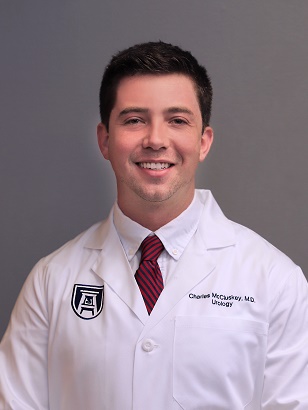Medical school is challenging enough as is, but imagine juggling school and being diagnosed with cancer.
Freeman McCluskey, MD, was an average 28-year-old medical student attending school in Macon, Georgia in 2020 when one day, he noticed that something was off.
“I noticed a lump in my scrotum and tried to convince myself for several days that it was just anxiety, that it was a figment of my imagination,” says McCluskey.
Testicular cancer is most common in young men in their late 20s and early 30s, and most agree that self-examination is the key to catching it early. McCluskey thanks his childhood pediatrician as well as a pediatrician he worked for before attending medical school who stressed the importance of self-examination to their patients.
He went to the student health center on his campus on a Friday and the following Monday, he received a call informing him that he had a tumor in each testicle. Cases like his are called synchronous bilateral testis cancer (SBTC) and are incredibly rare, representing less than 2% of testicular cancer patients
“These tumors are malignant until proven otherwise, which unfortunately means for testicular cancer, your testicle will have to be removed to really get a diagnosis,” McCluskey says.
Luckily, the survival rate for patients with testicular cancer is incredibly high at about 95% for the majority diagnosed; however, there are many challenges that a patient has to overcome, including infertility issues due to treatment, hormone replacement therapy, and the difficulty of putting life on pause.
“They’ve had such success with this disease that a lot of the research being done right now is actually trying to figure out how we can lessen the burden of survivorship of patients,” McCluskey says when discussing treatment options and the effects they have on patients.
McCluskey knew that he wanted to have his medical career focus on cancer, but after his diagnosis and treatment, he knew he wanted to specialize in urologic surgery. A urologist is a doctor who specializes in diagnosing and treating diseases of the urinary tract and reproductive system.
He is currently working on the Urologic Cancer Care team with Martha Terris, MD, and Zachary Klaassen, MD, as a urology resident for the next five years. Once he is done with his residency, he might complete a fellowship, which will take an additional two years, to become a Urologic Oncologist.
McCluskey wishes to return to Columbus, Georgia, his hometown, and become a physician there. He believes it is very important for physicians to have a connection to their community so they can better serve their patients.
If you would like to learn more about testicular cancer, check out this episode of a Cancer Conversation with Klaassen and view McCluskey’s above. If you have questions or would like to make an appointment with one of our urologists, call 706-721-6744 or visit our website.





